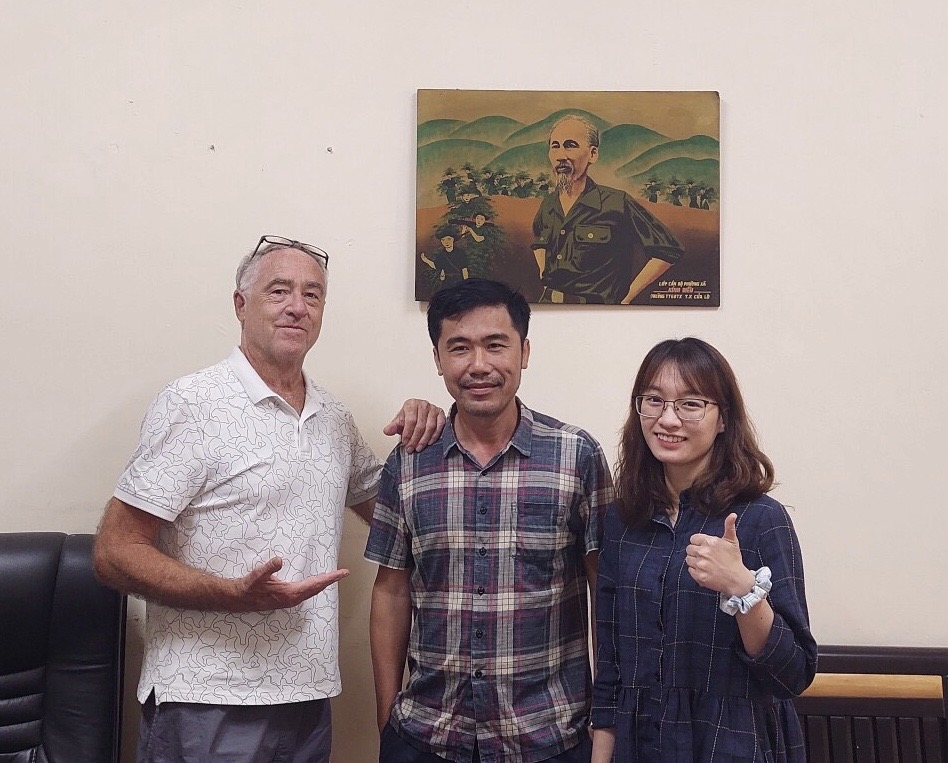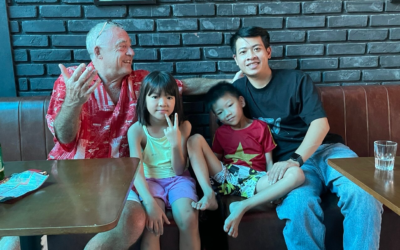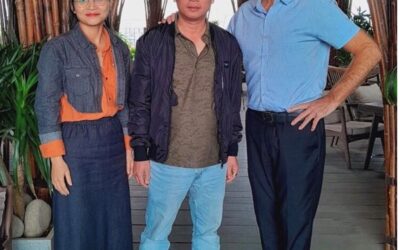I met Mr. Hai through his daughter, An Na (she’s a wonderfully talented artist, currently attending University in Australia). An Na and I met on the bus from Cua Lo to Vinh. We struck up a conversation and became quick friends.
I met her family while I was hunkered down in Cua Lo for an extended period. The COVID virus had closed all Nghe An schools and English centers. I took the opportunity for a lengthy sabbatical in my favorite beachside hamlet.
Before long, I was joining Hai (a high-school principal) and his family (wife, Tam, son, Minh and An Na) for daily meals at their home. We hit it off. It was during one of those repasts that he offered me a job: teaching English at his school, as well as other schools and English centers in Cua Lo.
Hai explained that there were lots of struggling families in Cua Lo. The virus has essentially eliminated two summers worth of tourist trade (the town’s main source of income). He felt strongly, that English was vital for the children of Cua Lo, as he foresaw an influx of Western tourism in the near future. English, he reckoned, was more important for the children of Cua Lo than perhaps anywhere else in the Nghe An province. I respected the man immediately. Not only for his altruistic leanings but his foresight. He was clearly, a visionary.
Needless to say, I jumped at the offer. A win-win, if ever there was one…
Mai and I recently met with Hai in the courtyard of his high-school. We sat at a wooden table shaded by mango trees.
Hai is 49-years old. He was born in Nghi Loc (only a few kilometers from Cua Lo).
“Despite living so close, I didn’t spend a lot of time here in my youth. It wasn’t until 1997, when I took a teaching position in Cua Lo, that I was able to fully appreciate the town.”
Hai moved to Cua Lo, taught high-school biology, married Tam in 2000 (she’s a biology teacher at another local high-school), and also worked for the Nghe An Department of Education. He even managed to squeeze in a PhD (Doctor of Biology) from Vinh University, before accepting the job as principle of Trung tam Giao due thuong xuyen #2 in Cua Lo (you need a degree just to remember the name of his school!) …
‘What has changed in Cua Lo over the past 25-years?’ I asked.
“The changes have been positive,” Hai explained. “We have been able to benefit from our natural resources: the ocean, the beach and our tropical environment. Tourism has grown and people have prospered as a result. Everyone from fishermen, to laborers, to hotel and restaurant owners. This has allowed the people of Cua Lo to live a more comfortable, fuller life.”
Mai wanted the skinny on why Hai hired me…
“English is very important for the children of Cua Lo. Their parents will not learn it, it’s too late for that. But their children can. And their children can deal with the growing Western tourist trade that is sure to come. With an English education, many of these young people will not have to leave Cua Lo to find work. They can stay here and help support their families or carry on their family businesses. English will also provide them the skills to go out into the world and succeed.
“Soon, we’ll open an English Club here on campus. A free space for all Cua Lo students. It will be a place for young people to practice English, in a fun, relaxed atmosphere.”
{Writer’s Note: Mr. Hai’s largesse is not limited to Cua Lo. He is very active in fundraising and has created sustainability programs (medicinal plants and herbs) for the Tai people, an ethnic-minority in the Nghe An province} …






0 Comments